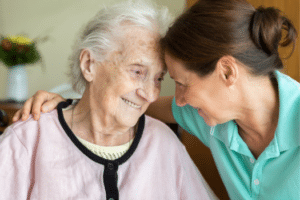Scams targeting seniors are becoming more common and more complex.
Image source: Ulrich Joho
My grandmother is the perfect target for a scam artist. Hard-of-hearing, nearsighted, mild-mannered, and open-hearted, I’m not ashamed to say she’s ripe pickings for a fraudster. Fortunately, she has a home health aide, as well as many friends and family members, who look out for her. However, if she didn’t, I don’t doubt she would’ve been taken advantage by a scam targeting seniors by now.
Why seniors are targeted
There are many reasons why seniors are targeted for scams. They are perceived as having a lot of money saved up. Many are reluctant to entrust their money and valuables to banks, so they may keep assets in the home. They grew up in a time period that had greater respect for authority and elders. When they see an official-looking person in a uniform, or receive a call from someone claiming to be from the utility company, they may be quick to buy into the person’s claims.
In addition, they often reside alone, and if friends and family members live far away, there is no one to watch over and protect them. They may be in the early stages of dementia, leaving them confused and disoriented at times. Often, physical deteriorations — such as poor eyesight and hearing — render them unable to understand what they agreeing to, or what they are signing.
Common senior scams
The types and complexity of scams against seniors are growing all the time. Although law enforcement and watchdog agencies work hard to crack down on fraud targeting the elderly, they have their work cut out for them. Two common types of senior scams include the following:
- Scammers posing as utility company professionals: These scammers will come to the house — sometimes in pairs. They claim there’s a leak in one part of the property, or that they have to check things like phone lines or gas meters. What they really do is take valuables from the house (often while the other scammer is distracting the senior), or case the home for a break-in later.
- Scammers who claim to be from collection agencies: They present a bogus bill to the senior, saying that the bill must either be paid, or they are authorized to seize the senior’s assets, including cash and jewelry.
How to help your senior avoid scams
A great way to help seniors avoid scams is to hire caregivers whom you trust. A good home health aide can supervise your senior’s affairs, and will be able to tell when something is off. If they greet a scammer at the door or on the phone, the scammer may be less likely to try and sweet-talk them or intimidate them. The scammer knows they are dealing with a person who is in complete possession of their faculties, and who may not hesitate to report them to the police.
Another way to prevent your senior from being victimized is by going over their bank accounts and financial statements regularly. And if your loved one’s mind is still fairly sharp, there are several additional things to you can do to protect them from scams:
- Tell them to discuss any important purchases or agreements with you first.
- Tell them to ask professionals who come to the door to provide identification. Make sure you verify the identification with the proper authorities.
- Make it clear they should not feel guilty about failing to donate to “charities” or people in distress (often scammers in disguise). Explain that if they have the funds and wish to donate to charity, you will help them do so.
- Make them aware of common scams so they can be on the lookout for them. Update them about new scams as needed.
Protect your loved one against exploitation
It’s never too early to begin getting involved, and protecting your loved one against scams. Get the facts, and make your elderly loved ones aware as well. Having as much information as possible beforehand may be the key in making sure your elderly family members and friends never have to deal with an unfortunate incident.
If you are unsure of how to best help an aging loved one, the trained and compassionate staff at the Institute on Aging is here to help you make that decision and gain the best in at-home senior care. Contact us to find out more.







